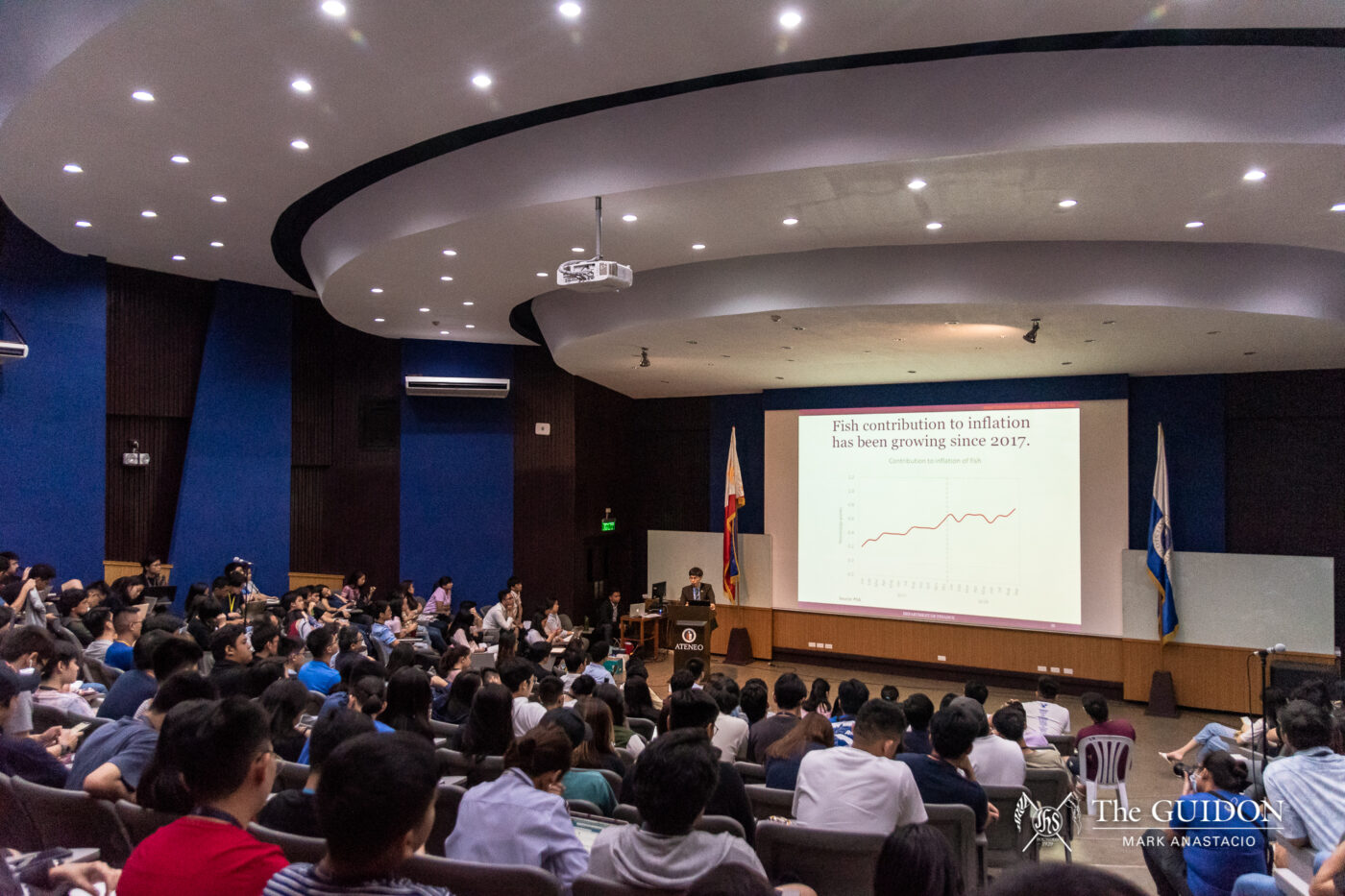Economic experts dissected the impact of tax reforms on growth and Filipino lives in the Forum on TRAIN Law and the TRABAHO Bill at Escaler Hall on Wednesday, October 10.
The forum was hosted by the Ateneo Economics Association (AEA) in partnership with the Ateneo Management Economics Organization (MEcO) and Economics Department as part of this year’s Talakayang Alay sa Bayan (TALAB), a yearly series of alternative talks and workshops focusing on different aspects of the national situation.
Divided into two segments, main panelist Department of Finance (DOF) Undersecretary Karl Kendrick Chua touched on the respective features and justifications of each tax system. Meanwhile, other panelists weighed in on the matter as they related them to their own fields of expertise. These were Economics Department lecturer Ricardo B. Ang III, Makati Business Club Representative and PricewaterhouseCoopers Chairman and Senior Partner Alexander Cabrera, and theology instructor Jaime Acevedo, PhD. Open forums then closed each segment.
TRAIN Law
Chua detailed the old tax system’s flaws, such as tax distribution inequity. He asserted that the Tax Reform for Acceleration and Inclusion (TRAIN) Law amends this by saturating the taxes on the upper class, which is the case for the implemented excise tax on fuel. Chua argued that it is the rich who consume most fuel rather than the poor.
Furthermore, Chua countered statements linking inflation to TRAIN, attributing August’s 6.4% inflation to the surging world oil prices and the resulting shift in demand due to Filipinos’ increased income, among other factors.
“Our reform is something that may be initially unpopular [since many Filipinos view it negatively], but this is something we should do,” he said.
Chua then concluded that TRAIN is about bridging the gap between economic opportunities and the poor by allowing people to pay for what they can afford.
TRABAHO Bill
For the next segment, Chua also highlighted the key points of the proposed Tax Reform for Attracting Better and High Quality Opportunities (TRABAHO) Bill. Similar to his first talk, he refuted “myths” surrounding the bill as well.
According to him, the bill does not merely serve the elite rich, but incentivizes or reduces taxes on companies whose performances qualify DOF standards.
Unlike the current tax incentive system, Chua said that incentives granted through TRABAHO are time-bound, ultimately ensuring that companies are motivated to socio-economically perform well. Moreover, smaller companies that excel will also be given more chances to receive tax incentives should the bill be approved.
Also present during the segment was Makati Business Club Representative and PricewaterhouseCoopers Chairman and Senior Partner Alexander Cabrera, who expressed support for the bill as well.
Throughout his talk, Cabrera illustrated the contrast between the current law and the TRABAHO Bill, focusing on reforms the former needs. One example Cabrera gave was the benefits of TRABAHO Bill’s “anti-tax avoidance” provision. This, according to him, would eradicate the practice of some companies taking advantage of it.
He concluded by asserting that “not everything should come from [the government’s] tax measures” when it came to the administration’s funding for its “Build, Build, Build” infrastructural thrust.
Inflation’s impact on malnutrition rates
Following Chua’s talk on TRAIN Law, Ang discussed his research on inflation’s impact on child malnutrition rates in the Philippines.
Although he said some of its results still need further study, he stated that rather than family income, Filipino children’s malnutrition rates increase because of the prices meat, fruits, and vegetables in the market.
To manage inflation, Ang noted that consumers should manage their response towards it as it largely affects prices of goods in itself.
Under Christian scrutiny
Furthermore, Acevedo, who has a doctorate degree in economics, also critically examined the moral and social implications of the TRAIN Law in light of the Catholic Social Teaching (CST) principles despite praising the DOF’s current efforts.
He contested the notion of equity through TRAIN by considering that the rich can afford either big or small changes is price, however for the common poor Filipino, a small increase in public transport fare, for instance, would already wound them.
“Inflation is not due to TRAIN Law primarily, yet it must be said that rise in excise taxes influences inflation,” he said, citing a colleague of his.
Towards the end of his speech, Acevedo quoted Pope Benedict XVI’s Caritas in Veritate. He reflected, “Lahat na ginagamit natin in an economic activity, [is] all a gift (Everything we use in an economic activity, is all a gift).”







